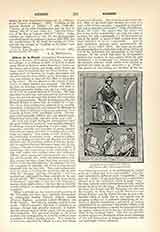

Gilbert Foliot, Bishop of London, b. early in the twelfth century of an Anglo-Norman family and connected with the earls of Hereford; d. at London in 1186. He became a monk at Cluny in France, where he rose to the rank of prior; then he was abbot at Abbeville, and later at Gloucester. He became Bishop of Hereford in 1147. As abbot and bishop he took an important part in ecclesiastical and national affairs, was a supporter of Empress Matilda and a confidential adviser of Theobald, Archbishop of Canterbury. In 1163 he was transferred to the Bishopric of London, though such a translation was very exceptional at the time; but he received the support of Becket and the special consent of Alexander III. Foliot was a man of learning and eloquence and a good administrator. The austerity of his life was almost too widely known. However, in the great struggle for the rights of the Church between Henry II and St. Thomas of Canterbury he definitely took the king’s side. In the stormy scenes at Clarendon and Northampton and during the prolonged negotiations of the years of St. Thomas’s exile, his name is foremost among the opponents of his archbishop; and he was one of the prelates who, by their remonstrances against a renewed excommunication in 1170, brought about indirectly St. Thomas’s martyrdom. It may be true that Gilbert was opposed to Becket’s personality and methods more than to his aims, but Henry II would have been more than a match for a diplomatic bishop. A king who combined to such an extent intelligence and passion could have been checked only by a wave of popular enthusiasm.
F. F. URQUHART

